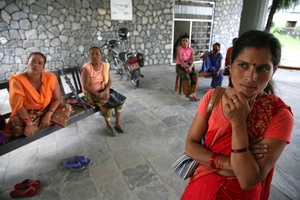Leave no one behind: First ever global meeting of TB patients and key affected populations
The Stop TB Partnership is convening the first ever global meeting of TB patients and key affected populations on 2nd and 3rd - 5th November in Bangkok, Thailand.
9 October 2015 – Geneva, Switzerland– The Stop TB Partnership is convening the first ever global meeting of TB patients and key affected populations on 2nd and 3rd - 5th November in Bangkok, Thailand. With support from USAID, the meeting on 2nd November will offer a platform for patients only to discuss their needs, identify opportunities for patient and community engagement in TB programs and responses, and increase knowledge around available resources for people who are sick with TB and their families. Twenty participants from 18 countries spanning four regions will add their voice and contribute to the development of a compendium of patient narratives to provide the needed patient perspective to inform and ensure successful programmatic interventions. The narratives once final, will be made available on the Stop TB Partnership's website.
The meeting on 3rd - 5th November will bring together
individuals from key populations for whom the effect of TB can
be particularly profound: children, miners, people who use
drugs, mobile populations (such as migrants and refugees),
prisoners, urban slum dwellers and the rural poor. According to
the Stop TB Partnership's
Global Plan to End TB 2016-2020: The Paradigm Shift,
key populations in TB are those that have increased exposure to
TB due to where they live or work, limited access to quality
services and/or are at increased risk of TB because of
biological or behavioral factors that compromise immune
function. The meeting aimed at building this knowledge from the
ground up will inform the development of six handbooks for
advocates, program implementers and other key stakeholders that
engage and work with key populations in TB.
"Unless
patients and communities are meaningfully engaged, ending TB
will remain a distant dream. However, unlike the HIV/AIDS
community, the level of engagement of the TB affected community
is very limited at the global, regional and national levels. In
this milieu, the initiative of the Stop TB Partnership to hold
the first global patients meeting and the meeting of key
affected populations is of critical importance and will go a
long way in ensuring greater involvement of the communities,"
said Blessi Kumar, Chair of the Global Coalition of TB
Activists.
Every year, more than three
million people with TB are missed by health systems-- people who
are either not being diagnosed or able to access treatment
following diagnosis. Even those who do assess treatment do not
always receive proper and patient-centered care. The
Global Plan to End TB 2016-2020: The Paradigm Shift,
constructed on the
End TB Strategy, challenges the traditional biomedical approaches to TB and
calls for policies and supportive system that are patient-driven
and have communities and civil society organizations at the
core.
Over 95% of TB deaths occur in low- and
middle-income countries. TB thrives in conditions of structural
inequity, where the complexities of poverty, social inequity,
rights-violations, conflict and patriarchy render communities
susceptible to TB and marginalize access to diagnosis, treatment
and care.
"Since I joined the Secretariat, I have
wanted to ensure that we make the space for TB patients,
vulnerable and most affected people to meet, discuss and advise
on how they can really be engaged in TB work at the country
level. So, to see people from all over the world come together
-- miners, refugees, the internally displaced, ex-prisoners,
people who use drugs, children and young people, people living
with HIV, women and urban slum dwellers discuss TB and how to
make TB history -- is a fantastic step forward towards making
'the leave no one behind' slogan a reality. Me and my team are
grateful for them taking time to join our meeting and we are
honoured to serve them."
Source:
Stop TB Partnership


